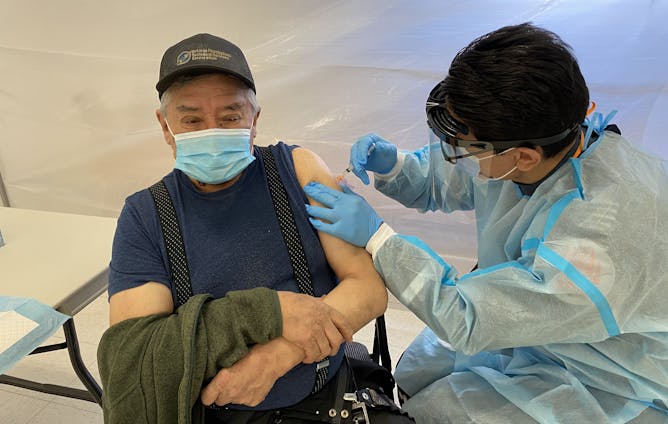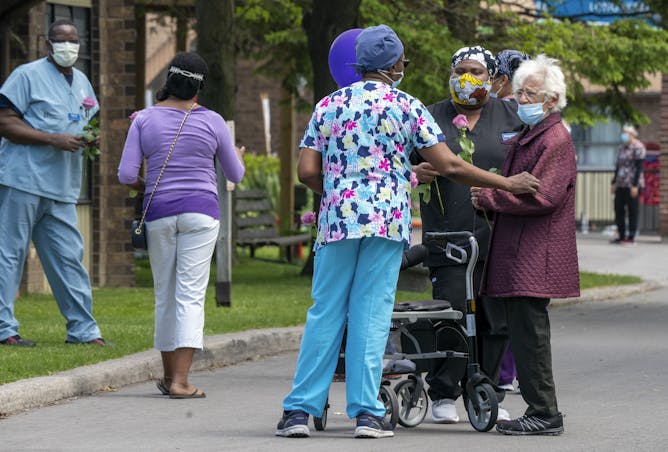|
Lately, media headlines have claimed the same thing about Indigenous people and the COVID-19 vaccination rollout: that they have a greater tendency towards vaccine hesitancy compared to the general population. That hesitancy, they say, is rooted in the damaging effects of colonialism and the historic mistreatment of Indigenous people.
But today in The Conversation Canada, Veldon Coburn from the University of Ottawa’s Institute of Indigenous Research and Studies explains that the reporting on Indigenous people’s supposed vaccine hesitancy is as sensational as it is incorrect. Indigenous people, for the most part, are not any more reluctant to get vaccinated than non-Indigenous Canadians.
Surveys conducted in First Nations communities and with Inuit populations show that this picture of Indigenous vaccine hesitancy flies in the face of data and research.
Also today:
Regards,
|

Indigenous people face enough health challenges and burdens that we do not need to excavate the past to embellish real concerns of the present.
(Ornge Media)
Veldon Coburn, L’Université d’Ottawa/University of Ottawa
The media reporting on Indigenous vaccine hesitancy is as sensational as it is incorrect. Indigenous people, for the most part, are not more vaccine hesitant than non-Indigenous Canadians.
|

People take part in a demonstration in Montréal in November 2020 to protest against government funding for infrastructure projects at two English-language educational institutions and also calling on the city to set up a body to protect the French language.
THE CANADIAN PRESS/Graham Hughes
François Larocque, L’Université d’Ottawa/University of Ottawa
The federal government's ambitious new plan to modernize the 51-year-old Official Languages Act is the most significant proposal on the status of French in Canada since 1982.
|

A resident chats with workers at Orchard Villa Long-Term Care in Pickering, Ont., in June 2020.
(THE CANADIAN PRESS/Frank Gunn)
Daniel Dickson, Concordia University; Patrik Marier, Concordia University; Robert Henry Cox, University of South Carolina
The COVID-19 pandemic has accentuated the scarcity resources in long-term care. But it has also revealed how staff are undervalued.
|

Children with anxiety disorders experience new challenges created by the pandemic restrictions.
(Shutterstock)
Christine Nguyen, University of Toronto
Moving between in-person and virtual schooling affects children with anxiety disorders like selective mutism. In addition, access to diagnosis and support is delayed because of pandemic restrictions.
|

Tous masqués! La ministre de la Santé du Québec, Danielle McCann, à gauche, le premier ministre du Québec, François Legault, à droite, et Horacio Arruda, directeur de la Santé publique nationale du Québec, se rendent à une conférence de presse sur la pandémie de Covid-19, en mai, à l'Assemblée législative de Québec. Le port du masque venait de s'ajouter aux mesures sanitaires.
La Presse Canadienne/Jacques Boissinot
David Crête, Université du Québec à Trois-Rivières (UQTR)
Quels mécanismes ont mené la population à obéir aux règles sanitaires décrétées par les autorités ? La peur, dans ce cas-ci d’un virus inconnu, a été fondamentale.
|
COVID-19
|
-
Michael S. Jaffee, University of Florida; Steven DeKosky, University of Florida
Because dementia patients are more likely to acquire COVID-19, and because so many live in close-quarter facilities – like nursing homes – it's critical to vaccinate them as quickly as possible.
|
|
Arts
|
-
Rachel Hadas, Rutgers University - Newark
Hope does not ride alone. It has a companion: anxiety. A classics scholar who is a poet notes that, at what may be the end of a long and dark pandemic year, both are in evidence.
|
|
Business + Economy
|
-
Sophie Van Huellen, SOAS, University of London; Nana Amma Asante-Poku, University of Ghana
Ghana remains heavily dependent on primary commodity exports for foreign exchange earnings.
|
|